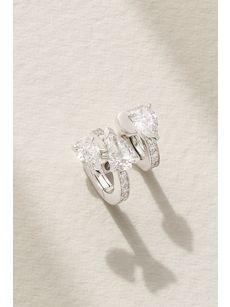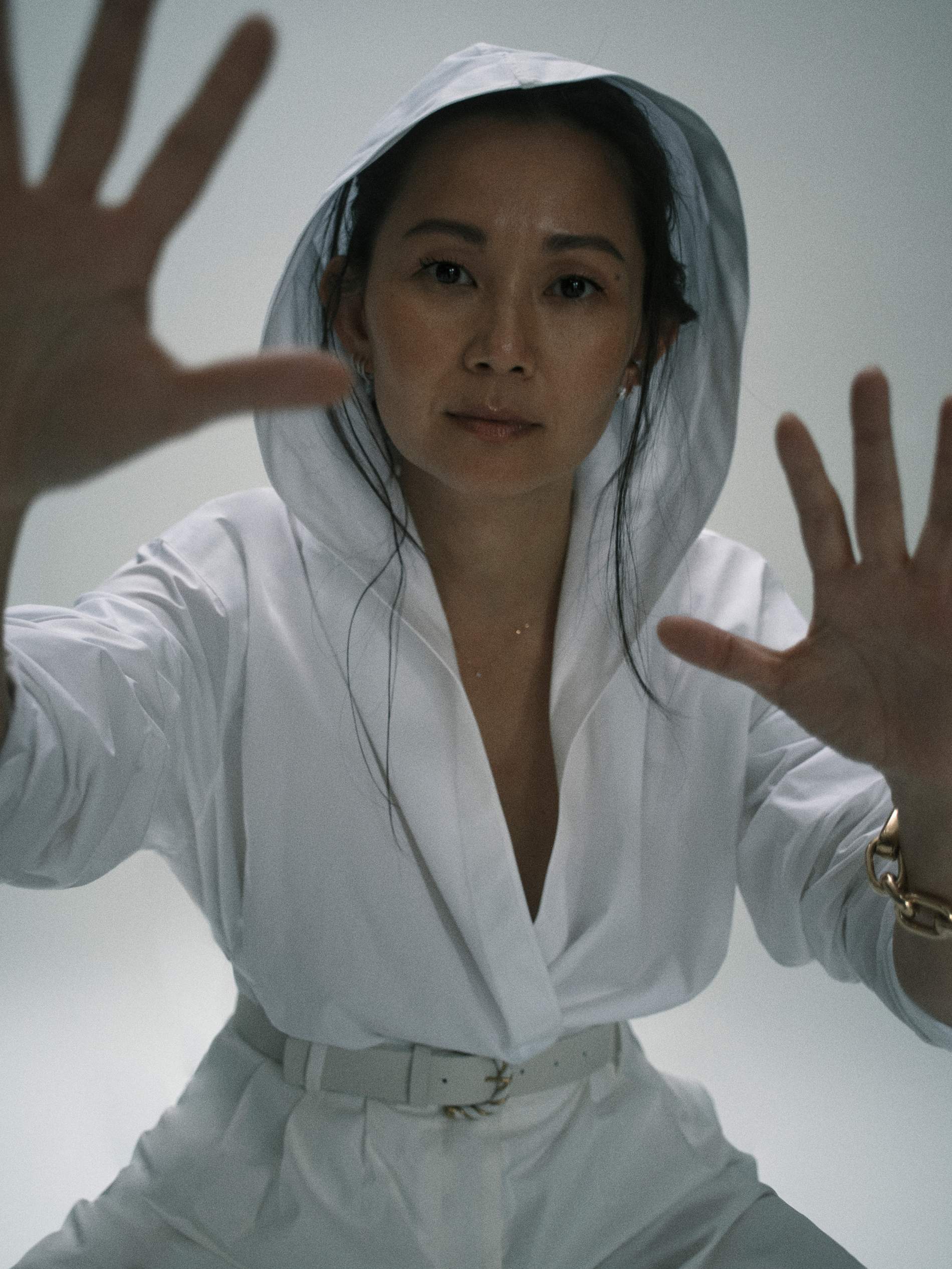In The Stars…
With
Hong Chau

She may be the scene-stealing, Oscar-nominated star of The Whale, but HONG CHAU isn’t driven by awards season or fame – she just wants to be proud of the work. Here, she tells SOPHIA LI how family, authentic filmmaking and advocating for equality continue to shape her character and career, plus what it was really like working with Wes Anderson on his hotly anticipated new movie, Asteroid City
In a world where movie stars are intensively media trained, often in possession of a large social-media following and juggling multiple business ventures on the side, Hong Chau has a refreshingly pared-back approach to Hollywood. “I never even wanted to be an actor to begin with,” Chau tells me on a spring afternoon in Manhattan. She forgoes social media (“Why do we give cat videos and pasta recipes the same real estate as school shootings?”) and says she isn’t overly precious about her roles: “I don’t care about the output; I care about the human connection.”
Her captivating, chameleonic talent has brought her to the big screen as a Vietnamese political activist opposite Matt Damon in Downsizing, a mordant maître d’ with blunt bangs in The Menu, and the tough-love, co-dependent nurse to Brendan Fraser’s character in The Whale – a role that earned her Best Supporting Actress nominations at the 2023 Oscars, BAFTAs and SAG Awards. She also appeared in Netflix’s action-thriller hit The Night Agent this year, captivating audiences as the White House chief of staff.
“I don’t CARE about the OUTPUT; I care about the human CONNECTION”
Indeed, Chau’s presence is so memorable that, with the exception of The Whale, she hasn’t had to audition for the past nine feature films she’s starred in. Amongst the filmmakers to take notice is Wes Anderson, who first saw her perform in 2015 in an off-Broadway play. “I didn’t even know he was in the audience,” she says. Years later, Anderson got in contact about a project that never came to fruition. Then, a few months on, the call came for Asteroid City.
“[Anderson] is one of the few filmmakers who follows their own compass,” she says. Prior to shooting the sci-fi rom-com about a junior stargazers’ convention (which just debuted at Cannes Film Festival), the writer-director sent an animation of the entire movie to all the actors, in which he voiced each of their characters. “He’s a very talented voice actor, too,” Chau laughs.
The atmosphere during production in Spain was familial, she shares. “I walked onto set the first day and a PA took me to the cafeteria, and you just see Francis Ford Coppola sitting there having lunch.” To ensure the comfort of the cast and crew, Anderson had searched for the perfect hotel before deciding on a shooting location – and with Hollywood royalty like Coppola dropping in, it soon turned into an acting camp of sorts, with everyone enjoying ‘family’ dinners together.
“It’s INVIGORATING, because everybody else who’s there is very ENTHUSIASTIC about being there. It feels like we’re all aware that films like this are UNICORNS these days”
The cast list itself reads like a Walk of Fame avenue: Steve Carell, Scarlett Johansson, Tilda Swinton, Jason Schwartzman, Bryan Cranston – joined by Margot Robbie and Adrien Brody – and Chau particularly enjoyed her time on set with Jeff Goldblum and Maya Hawke. “Sure, you see these people at cocktail parties and events, but it’s not quite the same when you feel like you’re in a fishbowl.”
Brody plays Chau’s husband in the movie, and they got along swimmingly, but she teases that Brody and Anderson’s dynamic was more like “cute bickering between two lovers”. This might have come from the director’s infamous multiple takes; Chau says that Cranston once kept count of the number of takes for one scene and it was a cool 79. “It’s actually very invigorating, because everybody else who’s there is very enthusiastic about being there. It feels like we’re all aware that films like this are unicorns these days.” As the director’s choice of medium is Kodak film, there is no monitor for the actors to look towards for a playback – so for every take, Chau gave something different to the one before, 79 times over.
“I don’t ever think about STEREOTYPES – I just look at whether it’s written or underwritten. Is it a DEVELOPED character or an overly simplified CHARACTER? That’s what it really comes down to”
This dedication to the craft is one reason why Chau believes Hollywood isn’t always as glamorous as it portrays itself. “If you actually work in the industry…. people are putting in really long hours and it can be physically taxing,” she says.
Then there’s the physical and mental toll that goes into the fight for representation, especially for a woman of color who was typecast into predictable roles for the first decade of her career. After Chau’s first feature film, Inherent Vice, in 2014, she could not secure another audition for a movie for two years. Her agency at the time was still sending her to Nickelodeon auditions. When she found out that none of her agents had actually watched her performance in Inherent Vice, she left and became her own agent, putting her personal contact information directly on IMDb – and that’s how the team for the off-Broadway play that first put Chau on Anderson’s radar was able to contact her. When the call came, she had just come from an audition playing a “low-level, ethnic, additional character,” Chau says. “I always thought of it as a little pin for pitchers, like, OK, these are their little ethnic actors that they keep in their bullpen. And every pilot season, [the studios] whip them out and put them in this show.”
Stereotypical roles often boil down to lazy writing, she says. “I don’t ever think about stereotypes – I just look at whether it’s written or underwritten. Is it a developed character or an overly simplified character? That’s what it really comes down to.”
She believes progress has been made in Hollywood, but questions the ongoing confines. “Everyone is like, ‘Hey, look at all these Asian nominees for the Academy Awards’,” she says. “We’re talking about things on the highest plane possible, but I don’t think awards are the best way to gauge whether we’re making progress. I always look at it as, are there more opportunities for people to learn the craft? There should be this healthy ecosystem for all levels of people in it, [and] not just Asians but… people with disabilities and beyond.”
Chau describes Michelle Yeoh’s Oscar win for Best Actress this year as wild – not because she was the first Asian woman to ever receive the accolade, but because Hollywood “treated her like she is finally doing a big role when she has been doing this for decades”. She also questions whether people are able to make a living across the industry – and it’s a timely topic: a week after we meet, the Writers Guild of America go on strike for the first time in 15 years, halting Hollywood productions overnight, and demanding the right to earn a living wage in a multi-billion-dollar industry.
The rawness Chau brings to her roles – and the candor she gives to this conversation – can perhaps be traced back to her upbringing. Born in a Thai refugee camp to Vietnamese parents who had fled the war then immigrated to the United States, Chau grew up with her brother in New Orleans. She remembers being “very drawn to melancholy things” as a child, and her brother renting 99-cent independent films (“they were all we could afford”) while her parents watched Entertainment Tonight.
Television in their household was more of a comfort blanket than an escapist tool. Her immigrant, working-class parents were overworked and tired. “It’s so funny to me when people talk about [Asian] stereotypes, like playing violin or piano lessons growing up. I’m like, ‘Fuck you. I wish my parents could afford that or forced me to do piano lessons’,” she says. She wishes she could tell her younger self that it’s OK to be sad and confused, too: “You can sit with it, it won’t kill you.” And she would tell her parents they were doing a great job; she could never imagine coming to a country not knowing the language, having no money and raising kids. Chau clarifies that the no-money part is not hyperbole, either: when her parents landed at the airport with their refugee group, each family was handed $5 – and that was the start of their American journey.
Reflecting on the experiences of the Asian-American community over the past few years, Chau remembers her parents having a convenience store while she was growing up, as well as the violence they experienced during that time. “This predated all of the hashtags and media coverage,” she says. “Violence for the most part happens to Asian Americans who have an accent, who are elderly or are the most vulnerable members of our community.” She doesn’t want to be asked on a red carpet how she feels about them – she wants the microphone to be passed to these members directly.
These days, her parents are doting grandparents to her daughter and believe the pinnacle of success is for Chau to star on Dancing with the Stars. “We yell a lot – that’s our normal decibel,” she shares of family life. “My husband is like, ‘Oh my god, what’s wrong?!’ I’m like, ‘We’re just chatting, nothing’s the matter’.”
It’s clear that family is key to the actor, but that doesn’t mean it affects her workload. Indeed, in 2020, Chau and her husband welcomed the arrival of their daughter. Then, in 2021, she filmed four feature movies, including The Whale, The Menu and Asteroid City. It was a huge feat in such a short space of time, but each project served to further propel her career. “I honestly could not have done it if I didn’t have a very supportive husband,” she considers. “People are always taken aback when they ask, ‘So, what does your husband do?’ [and I answer], ‘He takes care of our daughter.’”
Now, the universe is the limit for Chau, with film critics predicting a slew of awards next season. However, she waves all that away: “I’m just interested in the filmmakers,” she insists. “I’m calling in the directors that I want to work with.” She cites a list with whom she’d love to collaborate, including Christina Choe of Nancy, Japanese-American screenwriter and director Atsuko Hirayanagi, and Korean-American filmmaker So Yong Kim – all brilliant, inspiring filmmakers. She does have one final requirement for them, though: “Oh, they have to be really fun,” she laughs.
Asteroid City is in movie theaters from June 13
SHOP THE SHOOT
 REPOSSISerti Sur Vide 18-karat white gold diamond single earring
REPOSSISerti Sur Vide 18-karat white gold diamond single earring THE ROWBufus pleated cotton-poplin straight-leg pants€828.00View Product DetailsSelect a Size0 - out of stock2 - out of stock4 - out of stock6 - out of stock8 - out of stock1012 - out of stock14 - out of stock
THE ROWBufus pleated cotton-poplin straight-leg pants€828.00View Product DetailsSelect a Size0 - out of stock2 - out of stock4 - out of stock6 - out of stock8 - out of stock1012 - out of stock14 - out of stock YVONNE LÉON18-karat white and yellow gold diamond hoop earrings
YVONNE LÉON18-karat white and yellow gold diamond hoop earrings YVONNE LÉON18-karat yellow and white gold diamond necklace
YVONNE LÉON18-karat yellow and white gold diamond necklace




